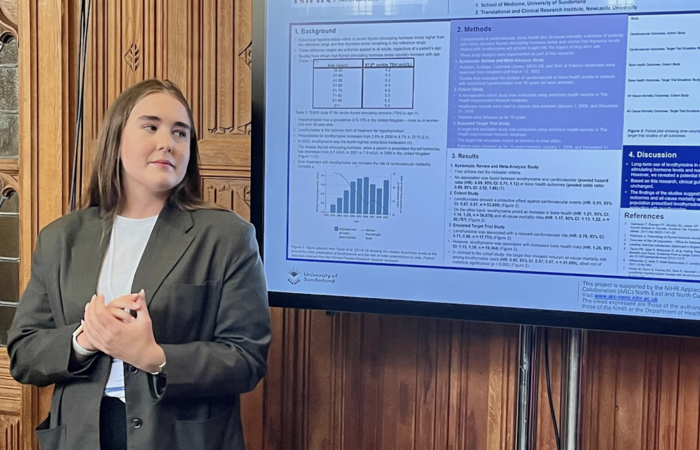Research will lead to rethink in how thyroid medicines are prescribed
In Profession news
Follow this topic
Bookmark
Record learning outcomes
Students from the University of Sunderland have said their research which found levothyroxine can impact bone health and “contribute” to mortality in patients who have hypothyroidism could lead to a rethink in the way medicines for thyroid conditions are prescribed.
PhD student Mia Holley (pictured) told a conference organised by the Society of Academic Primary Care in Bristol that having researched the effects of levothyroxine on patients who have an underactive thyroid gland, she discovered the medicine may pose risks to bone health as well as have “beneficial cardiovascular outcomes.”
The university, who revealed Holley looked at the electronic healthcare records of six per cent of the UK population over the age of 50 during her research, said she and her colleagues will now research how levothyroxine could be prescribed alongside bone protection medication “to improve health outcomes.”
The University of Sunderland told Independent Community Pharmacist the electronic healthcare records she accessed were "NHS records managed through the UK primary care healthcare database which are completely anonymous."
“We analysed various outcomes associated with levothyroxine use and provided vast insights into its benefits and risks for this patient group,” she said.
“These findings have the potential to significantly impact clinical practice by offering more informed guidance on levothyroxine prescribing, thereby improving patient outcomes.”
Another student at the university, Mohammed Saif Farooq, who researched the consequences of over-diagnosing hypothyroidism in an ageing population, said he hoped their work “informs and refines future trials on the cardiovascular and bone health outcomes of levothyroxine in ageing subclinical hypothyroid patients.”
“Our aim is to mitigate unnecessary risks, enhance patient safety and levothyroxine efficacy for older patients with subclinical hypothyroidism,” he said.
Professor Scott Wilkes, who heads up the school of medicine at the university, said the students’ research “is set to challenge guidelines for the treatment of elderly people with sub-clinical hypothyroidism.”
“They have shone a very bright light on the cardiovascular benefits and bone health risks in this group of patients,” he said.
Image (from the University of Sunderland): Mia Holley presenting her findings at a conference organised by the Society of Academic Primary Care.

